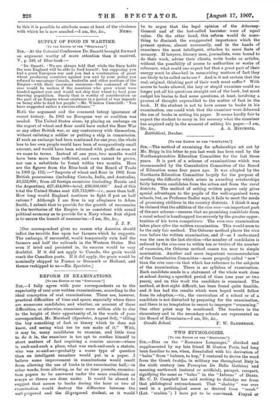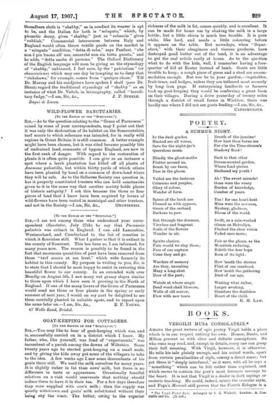TWO ETYMOLOGIES. -
[TO TUE EDITOR OF THE "SPECTATOR."] SIR,—Diez on the " Romance Languages," checked and supplemented by my late friend M. Gaston Paris, had long been familiar to me, when, dissatisfied with his derivation of " balzo" from " balzare, to hop," I ventured to derive the word from- the Greek graXEcr, in military use throughout Italy in the sixth century (see Procopius De Bello Gothico) and meaning earthwork (natural, or artificial),- parapet, rampart, signifying the same as " balzo" in the "Inferno " of Dante. Mr. C. D. Campbell has said nothing to dislodge me- from that philological entrenchment. That " shabby " was ever used in, a pathological sense as derived- from " sceab " (Lat. " scabies ") I have yet to be convinced. Frayed or
threadbare cloth is "shabby," as in conduct its weaver is apt to be, and the Italian for both is "sciupato," which, by phonetic decay, gives " shabby," just as " robaccia" gives "rubbish." Commercial intercourse between Italy and England would often throw to the goods on the market in a " sciupato " condition, " detta di roba," says Fanfani, " the none pin buona all' uso, ancorche non sia tutta guasta," and he adds, " delta allelic di persona." The Oxford Dictionary of the English language will soon be giving us the etymology of "shabby," unbiassed, I feel sure, by the " patriotism " (or chauvinisme) which may one day be tempting us to deny that "rickshaws," for example, comes from " quelque chose." Till Dr. Murray and his coadjutors have spoken I shall (pace Dr. Skeat) regard the traditional etymology of " shabby " as an instance of what Dr. Veitch, in lexicography, called " heredi-



































 Previous page
Previous page